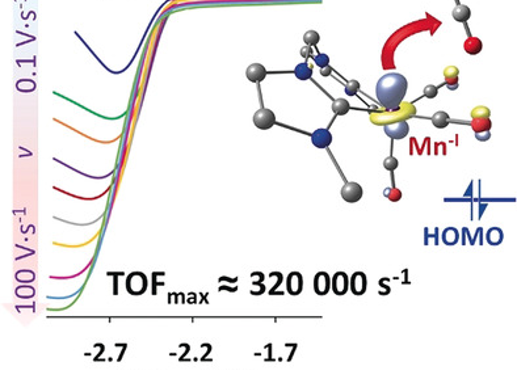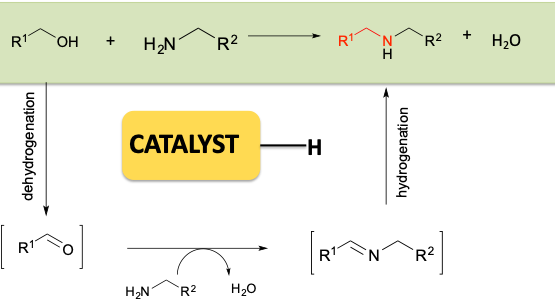Catalysis with Earth-abundant and Cheap Metals
We work on the development of new catalytic systems based on cheap metals (Fe, Mn, Ni) and N-heterocyclic carbene ligands for oxidation and reduction reactions (hydrosilylation, transfer hydrogenation, hydrogenation).
As an example, we have recently developed the first Mn complex capable to catalyse the reduction of esters to alcohols using a cheap and readily available silane (PMHS) as reducing agent. Metal-catalysed systems for ester hydrosilylation have mainly relied on the use of noble metals (Pt, Pd, Ir). The replacement of these precious metals by earth-abundant transition metals is a challenge. The simple and cheap Mn complex developed by us allowed the reduction of a variety of esters to the corresponding silanes in excellent yields.

Converting CO2 into usable energy and useful chemicals
The large-sale production of value-added chemicals and fuels from renewable energy and CO2 as a feedstock would contribute to increasing the sustainability of our society. Our group work on the development of Mn complexes for the electrocatalytic reduction of CO2. Recently, we have disclosed the excellent catalytic activity of fac-[Mn(CO)3(bis-NHC)Br] complexes for the selective reduction of CO2 to CO, exceeding 100 turnovers with excellent faradaic yields (95%) in anhydrous acetonitrile. The addition of water led to the highest maximum turnover frequency (TOF = 320000 s-1) ever reported for a manganese-based catalyst.

Synthesis of biologically relevant N-heterocycles through metal-catalysed borrowing hydrogen methods
The borrowing hydrogen (BH) methodology allows the construction of C-N and C-C bonds using non-activated renewable alcohols as starting materials. BH consist in a series of discrete steps involving sequential dehydrogenation and hydrogenation reactions. In our group we develop catalytic systems based on cheap and abundant metals capable to catalyse BH reactions for the construction of relevant N-heterocycles.

Collaborations









